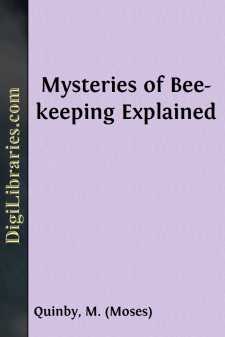Categories
- Antiques & Collectibles 13
- Architecture 36
- Art 48
- Bibles 22
- Biography & Autobiography 813
- Body, Mind & Spirit 142
- Business & Economics 28
- Children's Books 16
- Children's Fiction 13
- Computers 4
- Cooking 94
- Crafts & Hobbies 4
- Drama 346
- Education 46
- Family & Relationships 57
- Fiction 11829
- Games 19
- Gardening 17
- Health & Fitness 34
- History 1377
- House & Home 1
- Humor 147
- Juvenile Fiction 1873
- Juvenile Nonfiction 202
- Language Arts & Disciplines 88
- Law 16
- Literary Collections 686
- Literary Criticism 179
- Mathematics 13
- Medical 41
- Music 40
- Nature 179
- Non-Classifiable 1768
- Performing Arts 7
- Periodicals 1453
- Philosophy 64
- Photography 2
- Poetry 896
- Political Science 203
- Psychology 42
- Reference 154
- Religion 513
- Science 126
- Self-Help 84
- Social Science 81
- Sports & Recreation 34
- Study Aids 3
- Technology & Engineering 59
- Transportation 23
- Travel 463
- True Crime 29
Mysteries of Bee-keeping Explained
Categories:
Description:
Excerpt
PREFACE.
Before the reader decides that an apology is necessary for the introduction of another work on bees into the presence of those already before the public, it is hoped that he will have the patience to examine the contents of this.
The writer of the following pages commenced beekeeping in 1828, without any knowledge of the business to assist him, save a few directions about hiving, smoking them with sulphur, &c. Nearly all the information to be had was so mingled with erroneous whims and notions, that it required a long experience to separate essential and consistent points. It was impossible to procure a work that gave the information necessary for practice. From that time to the present, no sufficient guide for the inexperienced has appeared. European works, republished here, are of but little value. Weeks, Townley, Miner, and others, writers of this country, within a few years, have given us treatises, valuable to some extent, but have entirely neglected several chapters, very important and essential to the beginner. Keeping bees has been, and is now, by the majority, deemed a hazardous enterprise. The ravages of the moth had been so great, and loss so frequent, that but little attention was given to the subject for a long time. Mr. Weeks lost his entire stock three times in fifteen years. But soon after the discovery was promulgated, that honey could be taken from a stock without destroying the bees, an additional attention was manifest, increasing to a rage in many places. It seems to be easily understood, that profit must attend success, in this branch of the farmer's stock; inasmuch as the "bees work for nothing and find themselves." This interest in bees should be encouraged to continue till enough are kept to collect all the honey now wasted; which, compared with the present collections, would be more than a thousand pounds to one. But to succeed, that is the difficulty. Some eighteen years since, after a propitious season, an aged and esteemed friend said to me, "It is not to be expected that you will have such luck always; you must expect they will run out after a time. I have always noticed, when people have first-rate luck for a time, that the bees generally take a turn, and are gone in a few years."
I am not sure but, to the above remarks, may be traced the cause of my subsequent success. It stimulated me to observation and inquiry. I soon found that good seasons were the "lucky" ones, and that many lost in an adverse season, all they had before gained. Also, that strong families were the only ones on which I could depend for protection against the moth. This induced the effort to ascertain causes tending to diminish the size of families, and the application of remedies. Whether success has attended my efforts or not, the reader can judge, after a perusal of the work.
It is time that the word "luck," as applied to beekeeping, was discarded. The prevailing opinion, that bees will prosper for one person more than another, under the same circumstances, is fallacious....



